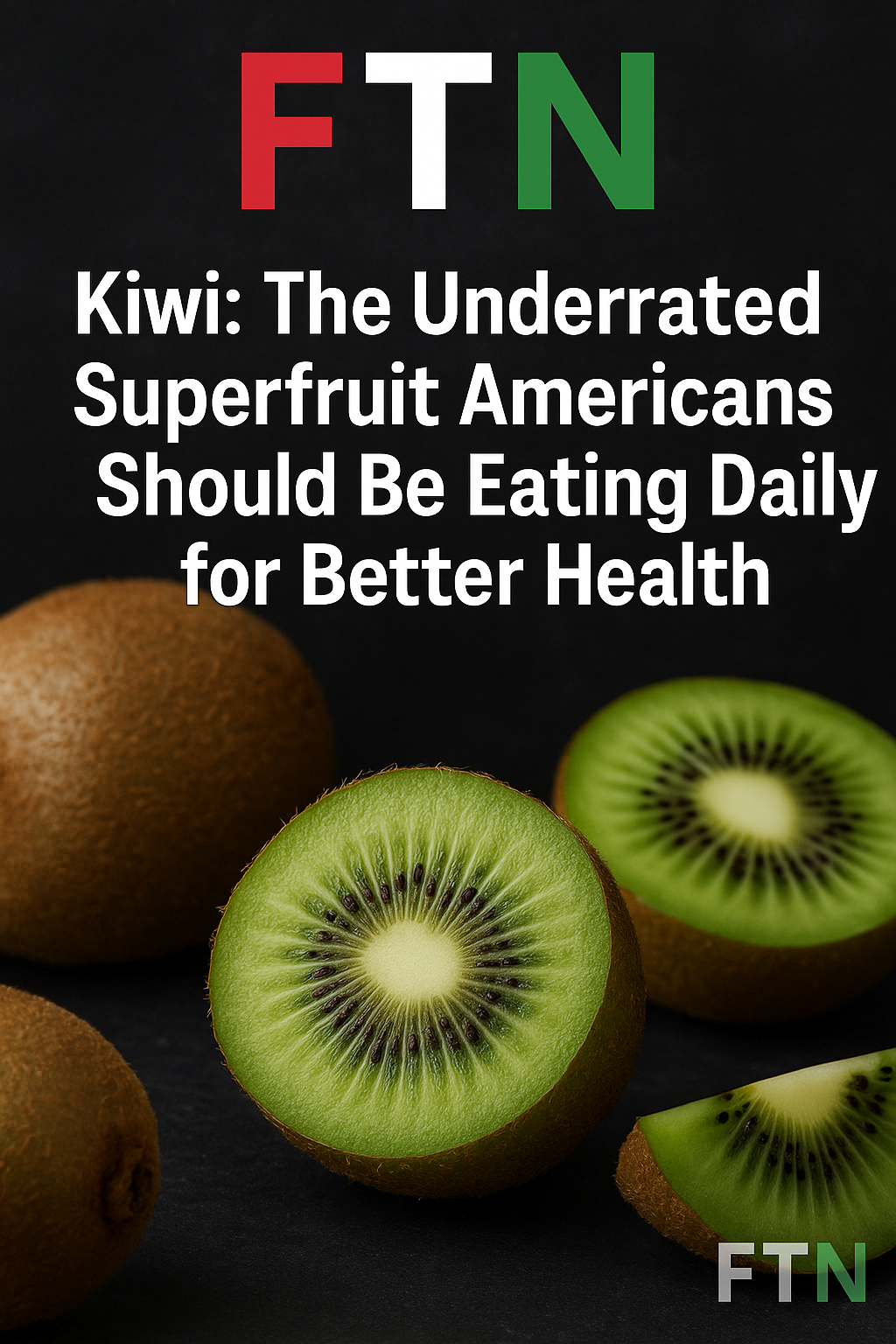🥝 Kiwi: The Superfruit Americans Are Missing Out On
When you think of superfruits, your mind probably jumps to blueberries, acai berries, or maybe pomegranates. But there’s one small, fuzzy fruit that often gets pushed aside on the grocery shelf — the kiwi. Surprisingly, this unassuming green gem might be one of the most underrated fruits in the American diet, despite offering an impressive range of health benefits.
In this article, we’ll dive deep into why kiwi deserves far more attention, its nutritional value, the science behind its health perks, how it compares to other fruits, and practical ways to include it in your diet — especially if you’re looking to boost your immune system, improve digestion, and support your heart and skin health.
🥝 What Is Kiwi, and Where Did It Come From
Kiwi, also known as kiwifruit or Chinese gooseberry, is a small oval fruit with a brown, fuzzy skin and bright green or golden flesh filled with tiny black seeds. Its tangy-sweet flavor is refreshing and unique, making it a popular addition to fruit salads, smoothies, and desserts.
Originating in China, the kiwi was brought to New Zealand in the early 20th century, where it got its name — inspired by the country’s iconic bird. Today, kiwi is grown in various parts of the world, including the United States, Italy, Greece, and Chile.
There are two main types:
Green Kiwi (Hayward variety) – Tangy, with vibrant green flesh.
Golden Kiwi – Sweeter, with smoother skin and yellow flesh.
Both types are rich in nutrients and offer similar health benefits.
🧬 Nutritional Powerhouse in a Tiny Package
Don’t be fooled by its size — kiwi is a nutritional giant. Here’s a snapshot of what a single medium-sized green kiwi (about 100g) contains:
Calories: ~41
Vitamin C: ~92.7 mg (more than an orange!)
Fiber: ~2.1 g
Vitamin K: ~40 mcg
Potassium: ~215 mg
Folate, Vitamin E, Copper, and powerful antioxidants
Kiwi is also low in fat, sodium, and sugar — making it one of the most nutrient-dense fruits per calorie.
💪 Top 8 Health Benefits of Kiwi
1. Immune System Support
Kiwi is loaded with vitamin C, which is crucial for a strong immune system. Just one kiwi provides over 100% of the recommended daily intake. During cold and flu seasons, eating kiwi regularly may help reduce the duration and severity of illness.
2. Improved Digestion
Kiwi contains a unique enzyme called actinidin, which helps break down proteins in the stomach. Combined with its high fiber content, this makes kiwi a powerful digestive aid that helps reduce bloating and support gut health.
3. Heart Health
Thanks to its potassium and antioxidant content, kiwi helps lower blood pressure and reduce the risk of heart disease. Some studies even suggest that eating 2–3 kiwis daily can lower blood triglyceride levels and improve platelet function.
4. Better Skin and Anti-Aging Effects
The antioxidants in kiwi — particularly vitamin C and vitamin E — help combat free radicals that damage the skin. Regular consumption can improve collagen production, leading to firmer, brighter, and more youthful skin.
5. Sleep Improvement
Struggling with sleep? Kiwi might help. In one study, participants who ate kiwi one hour before bed experienced improved sleep quality and duration. The presence of serotonin and antioxidants in kiwi is believed to contribute to its sleep-promoting effects.
6. Eye Health
Kiwi contains lutein and zeaxanthin, compounds known to protect against age-related macular degeneration (AMD). These antioxidants act like natural sunglasses, protecting your eyes from harmful light.
7. Weight Loss & Satiety
Low in calories and high in fiber, kiwi keeps you full longer. It’s a perfect snack for those trying to lose weight or maintain a balanced diet without feeling deprived.
8. Supports Iron Absorption
Vitamin C enhances the body’s ability to absorb iron from plant-based sources. Including kiwi in meals with legumes or spinach can help prevent iron deficiency anemia, especially in vegans and vegetarians.
🇺🇸 Why Americans Are Missing Out
Despite its benefits, kiwi remains under-consumed in the U.S. Here’s why:
Lack of Awareness: Many don’t realize how nutritious it is.
Unfamiliar Texture: The fuzzy skin can be off-putting — even though it’s edible!
Shelf Placement: Kiwis are often hidden or not well-promoted in stores.
Perceived “Exoticness”: Kiwi isn’t a traditional staple in American diets like apples or oranges.
But with increasing interest in superfoods, there’s never been a better time to shine a spotlight on kiwi.
🥗 How to Incorporate Kiwi into Your Daily Diet
Adding kiwi to your daily meals is easy, fun, and delicious. Here are some creative ideas:
🍴 1. Eat It Raw
Just slice it in half and scoop with a spoon — simple and mess-free!
🍓 2. Add It to Smoothies
Blend kiwi with banana, spinach, or Greek yogurt for a refreshing nutrient boost.
🥣 3. Top Your Breakfast
Use kiwi slices to brighten up oatmeal, granola, or chia pudding.
🥗 4. Mix Into Salads
Kiwi pairs surprisingly well with arugula, goat cheese, strawberries, and balsamic glaze.
🍰 5. Use in Desserts
Try kiwi in fruit tarts, parfaits, or frozen yogurt bowls.
Pro Tip: You can eat the skin! It’s packed with fiber and nutrients. Just wash it well.
🍎 How Kiwi Compares to Other Fruits
Here’s how kiwi stands against some popular fruits in terms of key nutrients per 100g:
| Nutrient | Kiwi 🥝 | Banana 🍌 | Apple 🍎 | Orange 🍊 |
|---|---|---|---|---|
| Vitamin C (mg) | 92.7 | 8.7 | 4.6 | 53 |
| Fiber (g) | 2.1 | 2.6 | 2.4 | 2.2 |
| Calories | 41 | 89 | 52 | 47 |
| Potassium (mg) | 215 | 358 | 107 | 181 |
As you can see, kiwi dominates in vitamin C and offers excellent fiber, antioxidants, and potassium — all for very few calories.
⚠️ Any Precautions?
Kiwi is generally safe for most people, but a few things to keep in mind:
Allergy Warning: Those with latex allergies may also react to kiwi.
Blood Thinners: Kiwi has mild blood-thinning properties, so consult a doctor if you’re on medication like warfarin.
Too Much of a Good Thing: Eating large amounts might cause mild diarrhea due to its fiber and enzyme content.
💚 Final Thoughts
Kiwi isn’t just a cute green fruit — it’s a seriously powerful superfood that supports your health in countless ways. From immunity and digestion to skin glow and heart health, kiwi brings a lot to the table — and yet it’s often missing from the American diet.
It’s time to change that.
So the next time you visit your local grocery store, don’t skip the kiwi section. Grab a few, enjoy them fresh, blended, or tossed in a salad, and treat your body to the vibrant, nutrient-rich boost it deserves.
Your health journey doesn’t need to be complicated. Sometimes, it starts with something as small, simple, and powerful as a kiwi. 🥝💚
Personal Take on the Video This video, “Is KIWI the BEST Fruit for Athletes?”, captures attention well—it highlights how just one kiwi daily can benefit immunity, digestion, and skin health. It matches my article’s theme by spotlighting key nutritional perks of kiwi. The presentation is engaging and optimistic, though it could be even stronger with some enhancements.
Sleep & Recovery Elite athletes consuming two kiwis 1 hour before bed nightly for 4 weeks showed improved sleep quality, longer total sleep time, higher sleep efficiency, and a better recovery-stress balance . A clinical trial also reported 35% reduced sleep-onset latency, 28.9% less waking after sleep onset, and increased total sleep time and efficiency .
Antioxidant Defense & Training Recovery Runners consuming two kiwis daily for two months displayed improved antioxidant defenses and reduced oxidative muscle damage, which may enhance fitness gains .
Sleep Aid Mechanisms Kiwis provide serotonin and melatonin precursors, alongside folate and antioxidants, which help regulate sleep cycles and promote better rest

